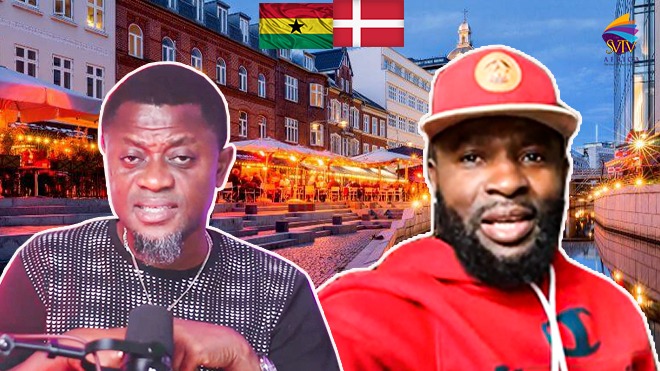King Karim, a Ghanaian living in Denmark, has shared his perspective on the realities of working abroad, especially for those who rely on skilled jobs. In an interview with DJ Nyaami on SVTV Africa’s Daily Hustle Worldwide, he explained why many Ghanaians struggle when they travel abroad without proper planning.
Karim cautioned that learning a skilled trade like barbering or sewing before traveling abroad is not always beneficial. He explained that such professions are not consistently in demand.
“A barber may only get customers once in a while, and the same applies to tailors,” he said.
Using examples, he noted that only about 2 out of every 50 skilled workers find steady employment. Many Ghanaians who travel abroad hoping to rely on skills like hairdressing or electrical work often find themselves struggling.
“If 20 Ghanaian barbers come to Europe, only about five will find work, and even then, most black people here don’t frequently cut their hair,” he explained. He also pointed out that people from other African countries prefer to get their hair done by fellow countrymen rather than Ghanaians.
Karim emphasized that in Denmark, skilled workers need to further their education to secure jobs. Without upgrading their qualifications, they may only find work a few times a month, making it difficult to survive.
According to Karim, many Ghanaians ignore warnings before traveling and later face serious hardships. He shared a heartbreaking story about his friend, a Fante man who moved to Germany and died due to extreme cold.
“He was supposed to meet a pastor, but the pastor abandoned him at a train station. He lived there for 2-3 weeks before pneumonia took his life,” he recounted.
Many Ghanaians also expect relatives or friends abroad to host them, but some end up stranded.
“I know people whose own brothers have been living in the same country for 15 years but have never met,” he said. He warned that some landlords abroad do not allow tenants to accommodate extra people, making it even harder for newcomers to find a place to stay
Securing proper documentation (nkrataa) is a major hurdle for many immigrants. Karim shared a story of a friend who spent 10 years abroad before finally getting his papers, and another who changed his age from 50 to 35 just to secure employment. Even then, he later complained that “35 is too old to work.”
Despite working in the same companies as their white colleagues, Karim observed that black immigrants struggle to progress in their careers.
Karim acknowledged that healthcare in Europe is far superior to Ghana’s.
“If you’re sick here, they will take care of you, and it’s free. In Ghana, if you fall sick and don’t have money, you can die,” he said. However, he criticized the eating habits of many people abroad, stating that the food is unhealthy and can lead to early death.
Unlike many immigrants who work multiple jobs, Karim revealed that he only works 8 hours a day and refuses to overwork himself. “Some people work two or three jobs, but I won’t do that,” he said.
Despite living abroad, Karim still has businesses in Ghana, but he is frustrated by the country’s economic challenges. He recounted how a woman he trusted collapsed his business, and how the banking system has become unreliable. “Sometimes, when I go to the bank to withdraw GHC 20,000, they don’t want to give me a receipt,” he lamented.
He also mentioned that selling cars in Ghana is difficult, as it can take up to two years to find a buyer. These frustrations have made him consider selling his businesses in Ghana entirely.
While Karim acknowledges that life abroad offers some advantages, he does not believe it is always better than life in Ghana. He advises Ghanaians planning to travel to be well-prepared and not assume that having a visa guarantees success.
“Some people come abroad and succeed, but many also suffer,” he concluded. “If you get the chance to travel, be wise about it.”
Watch The Video Below:
















